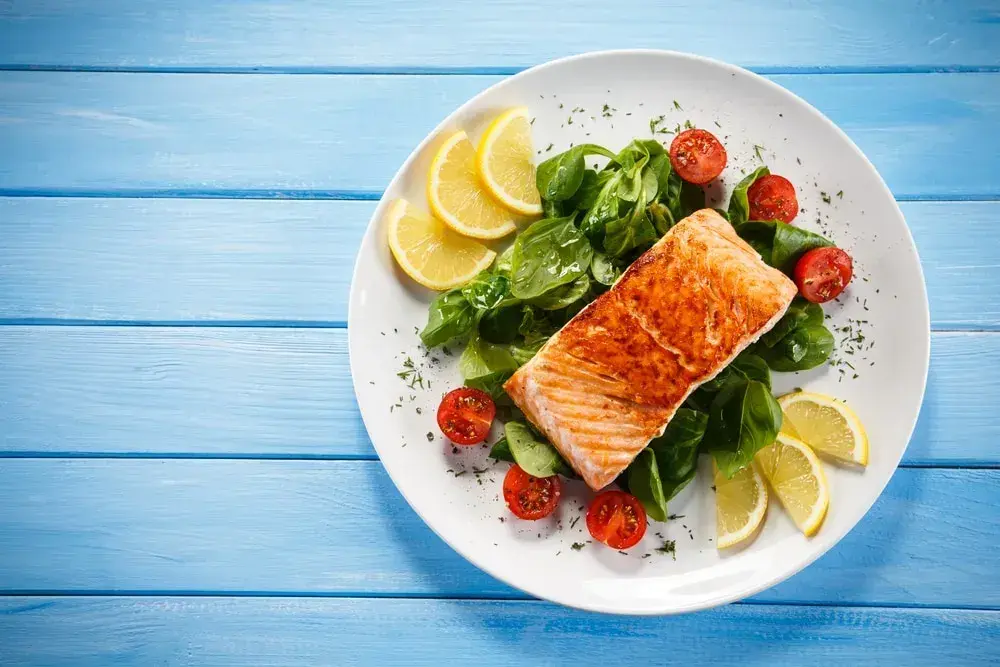
/assets/images/provider/photos/2578660.jpg)
A heart-healthy diet is good for losing weight and keeping weight off. Making lifestyle changes to lose weight and take care of your heart is a lifelong project that can be compared to a marathon rather than a sprint. If you approach it with the mindset that you can just make temporary changes, you’ll likely soon fall back into old habits and undo whatever progress you’ve made. Making significant improvements to your health requires adopting healthy habits that you can stick with for the long run.
If the thought of overhauling your diet seems overwhelming and just plain discouraging, think of it more in terms of adopting small but incremental habits that you can maintain and add to over time. A healthy diet shouldn’t feel like deprivation, but rather like an opportunity to find some new favorite foods that are great tasting as well as good for you. The following are some simple tips for making gradual, lasting dietary changes that are good for your heart — and your waistline — starting today.
Savor some succulent salmon
A mouthwatering serving of salmon, tuna, or lake trout twice a week can be a big step towards improving your health. These fish contain high levels of omega-3 fatty acids, which have been shown to reduce inflammation that damages blood vessels, contributing to heart disease. Omega-3s can also reduce blood clotting, help lower blood pressure, and decrease your risk of stroke.
Salmon and other heart-healthy fish can be very easy to prepare and serve. Add a little olive oil and a dash of seasoning, wrap it in foil, and place it in the oven for a delicious meal that’s good for your health. Grilled lake trout served alongside broccoli or asparagus makes for a tasty and guilt-free meal that can even feel like an indulgence!
If you don’t like fish, or it’s hard for you to make fish a regular part of your diet, a high-quality fish oil supplement can also help provide the anti-inflammatory omega-3 fatty acids you need to keep your heart healthy.
Eat more fresh fruits and vegetables
Health experts recommend we eat least 5 cups of fruits and vegetables per day, which can be difficult for many people. Look for ways to add fruits and veggies to the foods you already eat. Add some spinach to your eggs at breakfast; enjoy a handful of blueberries with a fresh salad at lunch time; have a crisp, delicious apple for an afternoon snack; and make a big vegetable stir-fry with a lean protein for dinner.
Fresh or frozen vegetables are best, along with fruit packed in water or natural juices — not sugar or syrup. Canned vegetables can serve as another source of easy-to-prepare vegetables, but be sure to look for those with a low sodium level, then check the back to see just how much sodium they consider “low.” Also keep in mind that starchy vegetables and legumes such as peas and corn will offer fewer nutrients than green veggies such as broccoli, asparagus, and Brussels sprouts.
Replace bad fat with healthy fat
We hear so much about the dangers of unhealthy fats in our diet that we often get the impression that all fats are bad. Dangerous trans fats lead to a much higher risk of atherosclerosis, which can lead to heart attacks or strokes. Chips, cookies, crackers, and fried foods often contain considerable amounts of these unhealthy fats. Check the ingredient label for anything that says “partially hydrogenated” to avoid hidden trans fats.
Again, this isn’t about depriving yourself of the enjoyment of great flavor in your foods. Monounsaturated fats are healthy for your heart and are plentiful in many delicious foods. Avocados and eggs make for a luxurious start to the day. Nuts and seeds are great snacks that can satisfy your desire to crunch something. Cooking with olive oil has long been a staple of some of the healthiest populations around the world. Enjoy these foods in moderation, and they can be a wonderful way to ease off those unhealthy fats you’ve been in the habit of eating.
Lower your sodium and raise the flavor
The recommended guideline for sodium intake is fewer than 2,300 milligrams per day, yet 90 percent of Americans consume more than this — far more, in fact. The average daily intake of sodium is more than 3,400 milligrams. There is a strong correlation between high sodium and high blood pressure. While sources of sodium include more than table salt, that’s where most of the sodium we consume comes from. Frozen meals and canned soups also play a large role.
In fact, we may be deadening our taste buds by overusing salt. Lowering the amount of salt used in food and replacing it with other healthy spices can evoke more flavor from our foods and help us appreciate the food we eat more. Try spices like basil and oregano to bring out the flavor in your food and start branching out into the world of flavor that doesn’t rely on salt as the main course. If your food seems to lack flavor at first without as much salt, give it a chance — you’ll likely be able to appreciate the flavor of other spices more after your taste buds have an opportunity to reset.
Expand your protein choices
Much of the fat in our meals comes from the same sources as our protein, especially from fattier foods such as bacon and red meat. Before you panic, you don’t have to give up your bacon and steaks, but think about how those meats affect your cholesterol for a moment and how a full-flavored alternative might let you savor your meal while making your heart happy as well.
Lean meats, grass-fed beef, and eggs are delicious as well as being better for your heart. A grilled, skinless chicken breast, lightly brushed with olive oil and then grilled with seasonings, is a healthy alternative that is bursting with flavor. Beans and lentils can make savory soups that will leave you feeling satiated, and may even help lower your risk of heart disease.
Make a plan to achieve your goals
Taking a few minutes each week to plan your meals can pay huge dividends in meeting your heart-healthy goals. The marketing departments for fast foods and convenience snacks have spent billions of dollars making it easy to grab something unhealthy. When you’re in a hurry, having a plan can mean the difference between wandering off track or having a quick, healthy solution.
Lay out a menu for the next week, planning not only meals, but snacks as well. Stock your fridge and pantry with a variety of snack options that are as convenient as they are healthy. Start using smaller plates to painlessly reduce portion sizes. Search out healthy recipes that make your mouth water and that you’ll look forward to preparing.
By being more proactive about your food choices, you can avoid many of the setbacks that keep you falling back into old habits out of convenience or familiarity. If you do experience a setback, don’t let it derail you. People often use one dietary misstep as an excuse to eat whatever they want and start over the next week. Instead, get right back on track and examine the factors that led to your unhealthy choices, so that you can formulate a plan for avoiding them next time. And don’t beat yourself up: a treat can be a well-deserved indulgence every once in a while, as long as it’s the exception to your healthy lifestyle and not the rule.
Need help losing weight or meeting other health and wellness goals? Garcia Weight Loss and Wellness Centers offer personalized weight-loss plans with consistent, professional support to help you reach and maintain your goal weight. Contact us today for a no-cost consultation!

Heart Health Awareness Month: How Weight Loss and GLP Medications Improve Cardiovascular Health
discover how GLP medications can boost weight loss and improve heart health. From lowering blood pressure to reducing the risk of heart attacks,...

